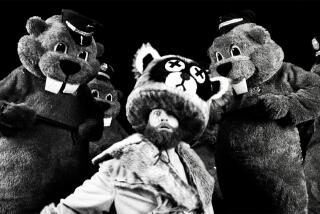It was that matter of principle
TELLURIDE, COLO. -- The more you hear about “Flash of Genius,” the harder it becomes to understand why veteran producer Marc Abraham chose this story above all others for his directorial debut.
It’s the saga of Bob Kearns, the inventor of -- are you sitting down? -- intermittent windshield wipers.
Kearns, who died not long ago, could be described as a driven and complicated man or, as one acquaintance said, “crazy.” And while he fought for years against automakers who he claimed infringed on his wiper patent, Kearns alienated many of his friends, colleagues and family, including his wife, who left him.
But the very facts that make “Flash of Genius,” which stars Greg Kinnear and opens in theaters nationwide on Oct. 3, sound so unapproachable are the very same elements that continuously drew Abraham toward the project. Now, more than 15 years after publication of the New Yorker article on which “Flash of Genius” is based, Abraham’s film is finally done -- it played over the weekend at the Telluride Film Festival and will be featured at this week’s Toronto International Film Festival. It’s quite a turnaround from the initial reaction Abraham received when he first pitched the project.
“Everybody laughed at me when you tell them the idea,” says Abraham, who has producing or executive producing credits on “A Thousand Acres,” “Air Force One” and “Children of Men,” among many others.
But “Flash of Genius” is hardly a chronicle of how car drivers came to see through misting rain. And it’s more than a David-and-Goliath courtroom drama about a man with few resources whose crusade matches him against the best scorched-earth litigators of the biggest auto makers. “Flash of Genius” is really a tale of someone who believed that fairness and honesty meant more than anything else -- including piles of money.
“That’s the reason I was passionate about it. . . . It was about principle,” Abraham says. “And principle is a very gray idea. And that’s what I thought was exciting.”
Like many inventors before him and countless others to come, Kearns was a dreamer and a tinkerer. A freak wedding night accident (a flying Champagne cork left one of Kearns’ eyes essentially useless) led the engineer and college professor to wonder about how -- and why --the eye blinked. Automobile wipers at the time were either on or off; they couldn’t be metered to swipe periodically.
In 1963, Kearns developed a prototype of his intermittent wiper, and showed it to and tried to manufacture it for Ford. By 1969, Ford introduced its own intermittent wiper that Kearns believed infringed on his patents. The eventual litigation would last decades, and take a terrible personal toll on Kearns. He declined to settle the case for millions because he wanted Ford to acknowledge its theft, an admirable (but often unrealistic) tactic.
Determined at best but obstinate at worst, Kearns is hardly a classic Hollywood hero, especially since his quest for justice led not only to a divorce but also a nervous breakdown. At one point, Abraham took the repeatedly revised script (credited to Philip Railsback) to then Universal studio chief Stacey Snider. “She said, ‘This is not an easy script, and he’s not a likable guy,’ ” Abraham recalls.
But Abraham couldn’t drop the movie -- he felt he had to keep pushing. What some might find unlikable in Kearns, he believed, is what made him a distinctive character. “Any man who goes up against a superior force is going to pay a heavy toll, and you have to have an obsessive side to you,” Abraham says of Kearns, with whom he consulted while developing the film’s script.
When Abraham finally got Universal (under new management) and Spyglass Entertainment to make the movie, he gave Kinnear a copy of “The Lost Weekend” to prepare for the role. The actor gained 15 pounds and wore brown contacts to look less handsome. Says Abraham of Kearns: “I want you to understand him, even when you don’t like him.”
It’s easy to equate Abraham’s obsession with Kearns’, but the filmmaker says it’s a false comparison. “I never thought about it in those terms,” Abraham says. “But I always wanted to do it. I didn’t want to be dead and have not made this movie.”
--
More to Read
Only good movies
Get the Indie Focus newsletter, Mark Olsen's weekly guide to the world of cinema.
You may occasionally receive promotional content from the Los Angeles Times.






